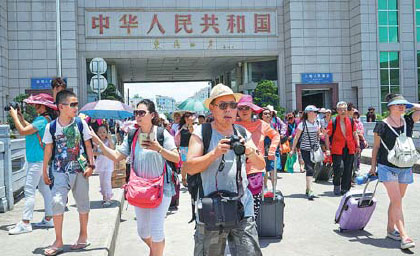Vietnam to curb scams and protect tourists' interests
|
A port of entry in Dongxing, a city in the Guangxi Zhuang autonomous region bordering Vietnam, is busy with a throng of tourists from both countries. Zhang Yang / For China Daily |
In a queue that stretched about one kilometer, Chinese tourists waited patiently to complete border procedures to enter Vietnam, unaware that some of them had fallen victim to dishonest travel agencies.
Over the past two months, the number of Chinese visitors to Vietnam's northern Quang Ninh Province via the Dongxing-Mong Cai border gate has surged dramatically. The number now sometimes surpasses 15,000 people a day, compared with 5,000-7,000 a few months ago.
More than 90 percent of Chinese people entering Vietnam via the Mong Cai border gate are tourists. Most of them tour Ha Long Bay and some other places of interest in Quang Ninh, said a local customs officer.
A young guide serving Chinese visitors who had booked through a Chinese travel agency said: "As far as I know, travel agencies in China are facing increasingly fierce competition, so they frequently lower charges for their outbound tours."
"They even offer free accommodation and meals to their customers," she said, adding that after luring a large number of tourists, the agencies join hands with their Vietnamese counterparts to wring money from the tourists.
According to the guide, most of the Chinese visitors to Quang Ninh stay for two nights and three days. They are told to stay at mini-hotels that charge 200,000-300,000 Vietnamese dong ($9-$13.5) a night and have meals worth a couple of dollars.
Standing in front of the white Vuon Dao Hotel building complex in Quang Ninh's Ha Long City, home to the Ha Long Bay World Heritage site, Wang Quanjun, a middle-aged Chinese tourist from Sichuan province, said that he and his family members felt comfortable here because the Chinese tour operator kept their promise of offering free accommodation and meals in Vietnam.
"We've just eaten seafood here, a kind of prawn, I think. It's very tasty but free," Wang said.
But Wang and his compatriots did not know that to enjoy free accommodation and meals, they would have to buy souvenirs or products at exorbitant black market prices later, with a commission given to travel agencies or their guides and drivers.
On their way to hotels or tourist sites, Chinese people are led to shops specially designated for Chinese shoppers.
The young guide explained the shops do not want to be visited by Vietnamese people, who are often aware of the right prices. If locals quarrel about the prices in the shops, Chinese visitors will realize they're being scammed.
In a one-story shop in Ha Long City, a large group of Chinese tourists were eagerly looking at or touching wooden handicrafts, such as bracelets and necklaces. They were also interested in precious stones and rubber pillows.
The products' prices are listed in yuan, violating a Vietnamese regulation that they must be listed in Vietnamese dong. "Purchases in foreign currencies will help shops to earn more profits by taking advantage of foreign exchange rates and dodging relevant taxes," an elder local resident said.
Tourists are sometimes even forced to pay more money for unscheduled visits to places of interest, and for products at exorbitant prices.
For example, an agarwood necklace can be sold for 3,000-5,000 yuan ($436-$726) in the specialty shops, while they are usually priced at around 1,000 yuan outside, the elder resident said.
To maintain a sound tourism environment for both travel agencies and tourists, provincial authorities have asked stakeholders, including the tourism administration, the police, taxation authorities and market supervisors, to inspect tour operators, shops and restaurants more frequently and more effectively.
"Quang Ninh is determined to clean up its tourism environment, and to strictly punish travel agencies involved in selling products to Chinese tourists at much higher prices than normal," said Vu Thi Thu Thuy, vice-chairwoman of the provincial People's Committee.
Do Duy Khanh, a tour guide at the well-known local travel agency, Viettravel, said: "Nowadays, Chinese tourists often choose to stay in five-star hotels, or four-star hotels at least. They also go shopping more frequently than before."
Vietnam received more than 3.2 million foreign visitors in the first quarter of this year, up 29 percent compared to the same period last year, according to the Vietnam National Administration of Tourism. Of them, 949,200 were from China, up 63.5 percent.

























